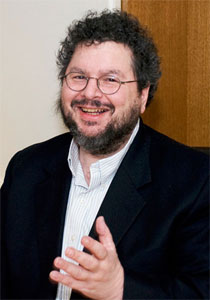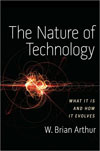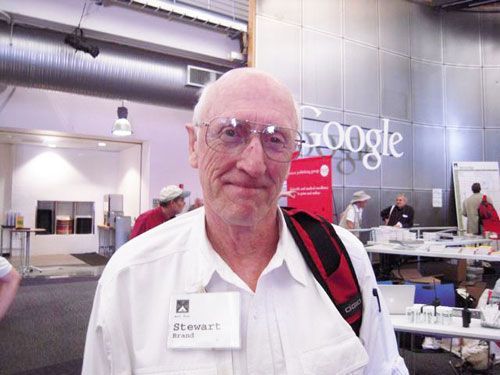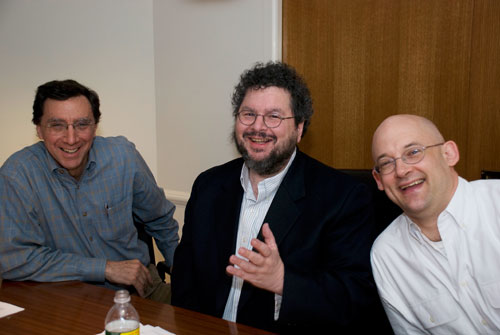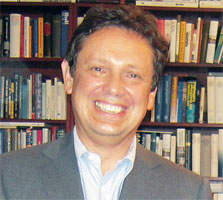
We are apparently now in a situation where modern technology is changing the way people behave, people talk, people react, people think, and people remember. And you encounter this not only in a theoretical way, but when you meet people, when suddenly people start forgetting things, when suddenly people depend on their gadgets, and other stuff, to remember certain things. This is the beginning, its just an experience. But if you think about it and you think about your own behavior, you suddenly realize that something fundamental is going on. There is one comment on Edge which I love, which is in Daniel Dennett's response to the 2007 annual question, in which he said that we have a population explosion of ideas, but not enough brains to cover them.
(*The term informavore characterizes an organism that consumes information. It is meant to be a description of human behavior in modern information society, in comparison to omnivore, as a description of humans consuming food.)
THE REALITY CLUB: Daniel Kahneman, George Dyson, Jaron Lanier, Nick Bilton, Nick Carr, Douglas Rushkoff, Jesse Dylan, Virginia Heffernan, Gerd Gigerenzer, John Perry Barlow, Steven Pinker, John Bargh, George Dyson, Annalena McAfee, John Brockman, David Gelernter, Evgeny Morozov
Introduction
By John Brockman
The most significant intellectual development of the first decade of the 21st Century is that concepts of information and computation have infiltrated a wide range of sciences, from physics and cosmology, to cognitive psychology, to evolutionary biology, to genetic engineering. Such innovations as the binary code, the bit, and the algorithm have been applied in ways that reach far beyond the programming of computers, and are being used to understand such mysteries as the origins of the universe, the operation of the human body, and the working of the mind.
Enter Frank Schirrmacher, Editorial Director the editorial staff of the FAZ Feuilleton, a supplement of the FAZ on the arts and sciences. He is also one of the five publishers of the newspaper, responsible for the Feuilleton, and he has actively expanded science coverage in this section. He has been referred to as Germany's "Culture Czar", which may seem over the top, but his cultural influence is undeniable. He can, and does, begin national discussions on topics and ideas that interest him, such as genomic research, neuroscience, aging, and, in this regard, he has the ability to reshape the national consciousness.
I can provide a first-hand account of "the Schirrmacher treatment".
In May of 2000, he published a manifesto in FAZ, a call-to arms,entitled "Wake-Up Call for Europe Tech", in which he called for Europe to adopt the ideas of the third culture. His goal: to change the culture of the newspaper and to begin a process of change in Germany and Europe. "Europe should be more than just a source for the software of ego crisis, loss of identity, despair, and Western melancholy," he wrote. We should be helping write the code for tomorrow."
The Manifesto, and Schirrmacher's publishing program, was a departure for FAZ which has a somewhat conservative profile, and it was widely covered in the German press and made waves in intellectual circles. And a decade later, the national conversation continues. (See this week's Stuttargarter Zeitung).
Within weeks following publication of his manifesto, Schirrmacher began publishing articles by notable third culture thinkers such as Bill Joy, Ray Kurzweil, V.S. Ramachandran, Patrick Bateson, James Watson, Craig Venter, David Gelernter, among others. Soon after, he devoted an entire edition of the Feuilleton to a printout the Human Genome code published by Craig Venter, which caused a sensation in Germany.
Then came 9/11. And everything changed. Schirrmacher was on to the next story.
I hadn't heard from him in a while when in July he emailed me from Vietnam. He was thinking about, and researching, ideas concerning the effect of new information technologies on human knowledge, on how the Internet is modifying our cognitive structures, on how we can begin the understand the cultural changes happening in today's technology/knowledge interface. He asked for my help regarding questions he had for George Dyson, Danny Hillis, Richard Thaler, and Larry Page.
With Schirrmacher, once he's obsessed with an idea to which you may happen to be connected, expect to be kept very busy. Dozens of emails went back and forth until, finally, I caught up with him in person in October for a conversation in his Frankfurt office.
So, what are the questions Schirrmacher is asking himself?
He is interested in George Dyson's comment "What if the price of machines that think is people who don't?" He is looking at how the modification of our cognitive structures is a process that eventually blends machines and humans in a deeper way, more than any human-computer interface could possibly achieve. He's also fascinated in an idea presented a decade ago by Danny Hillis: "In the long run, the Internet will arrive at a much richer infrastructure, in which ideas can potentially evolve outside of human minds."
We discussed his notion that computer platforms can be seen as socio-biological systems which repeat three of the major concepts of the 19th century on an individual level: Taylorism (multitasking), Marxism (free content and copyright) and Darwinism (search algorithm and information foraging). "The Darwinian perspective is the most interesting," he says. "Information being an advantage for the informarvores and software that codes it with cues from foraging habits of the prehistoric man".
—JB

[ED. NOTE: The conversation was in English, Schirrmacher's second language. Rather than edit the piece for grammar, and risk losing the spontaneity of the conversation, I present it here — for the most part — verbatim.]
FRANK SCHIRRMACHER is a an influential German journalist, essayist, best-selling author, and since 1994 co-publisher of the leading national German newspaper Frankfurter Allgemeine Zeitung (FAZ), where he is Editor of the Feuilleton, cultural and science pages of the paper. He is the author of the Das Methusalem-Komplott (The Methusaleh Conspiracy), a book, published in 14 languages selling more than one million copies in Germany, on that country's aging society; and Payback: Warum wir im Informationszeitalter gezwungen sind zu tun, was wir nicht tun wollen, und wie wir die Kontrolle über unser Denken zurückgewinnen (Payback: Why in the Information Age we are forced to do what we do not want to do and how we can recover control over our thinking, November, Karl Blessing Verlag).
Frank Schirrmacher's Edge Bio Page

